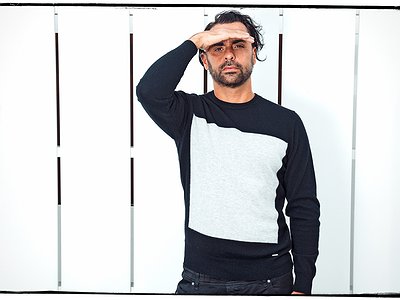Could you take us through a day in your life, from a possible morning routine through to your work? Do you have a fixed schedule? How do music and other aspects of your life feed back into each other - do you separate them or instead try to make them blend seamlessly?
I’m up first in our home; everyday (during the week) I’m up about 7am, while my son and wife continue to sleep. I grab some fruit, answer some emails, and then take our dog ‘Funny’ for walk. At about 8 we get home, I get everybody up and then make my son's breakfast ahead of taking him to nursery. I’m back about 10am (on a good day) depending on what day of the week it is, I’ll aim to go for a run, which will be between 5-10 miles. About 11 I'll see what needs to be done that day, wether it be booking Circus, A&R/running circus recordings, or carioca (my labels), working on music, remixing, going through gig offers, or doing interviews, or working on various projects (like the 3D Dolby Atmos sound system). I do a few hours on each of my activities in the office and studio, but then I’m home for my family. I put my son to bed, probably spend another hour in the office then hang out with my wife before bed. That’s pretty normal. I head to the Circus Club office a couple times a month too.
The above is all midweek, at the weekends you can catch me flying around the globe from gig to gig, before getting back Sunday night to repeat the aforementioned …
Could you describe your creative process on the basis of a piece or album that's particularly dear to you, please? Where did the ideas come from, how were they transformed in your mind, what did you start with and how do you refine these beginnings into the finished work of art?
I would say the idea for a record can be pretty small; it does not have to be an expansive point of view. For example when I made ‘life is too short’ (forthcoming on Hot Since 82 Knee Deep in Sound label) it was made as a poignant statement track about the plight and overall stupidity of the world in 2017 - how inharmonious the world is and the fact that there is no time to fight over such pathetic problems. Having a proper message is pretty rare. With the exception of my vocal tracks, my instrumental tracks seldom have deeper meaning (Come Home, my release on Cocoon had a message).
I started ‘life is too short’ with a genuine feeling of sadness and having hope for people. I sat down to make a track that was cinematic, riding through dark areas but ended with a powerful uplift. The original version never had any drums; it wasn’t for clubs. As the track got close to completion I decided it would be wasted to never be used for my typical club use, so I had drums, mixed it down sent it to Hot Since 82, who signed it right away. I’m glad he enjoyed it from his interpretation of it as a club record, but for me it’s much more.
There are many descriptions of the ideal state of mind for being creative. What is it like for you? What supports this ideal state of mind and what are distractions? Are there strategies to enter into this state more easily?
I don’t have the luxury of spare time to get in the state of mind to do any of my roles to be honest. Although I complete about 2 full tracks per month, it's never a relaxed choice, it’s almost scheduled in by myself. That said when DJing, - which is what I do most of, I need to have time to go through my music, absorb it and make sure I know the records and I’ve got my definitive weapon record that will tie my entire set together. If I’ve spent time preparing on a plane, or a train and had some food, and if I’m lucky some rest, then I play better. I need to feed energy to and from the crowd in front of me, I enjoy it more when I can connect with the audience
How is playing live and writing music in the studio connected? What do you achieve and draw from each experience personally? How do you see the relationship between improvisation and composition in this regard?
It really depends where I am creatively. I don’t always make records just for the dance floor, however there is never any better environment to gauge your music than a club. No mater how many times I test my music in my car, in the studio or to friends, it’s the club that gives the soundest advice (no pun intended). More recently my studio output has been intentionally restricted to club music, so having an in depth knowledge of endless clubs & festivals around the world really helps my process. One thing that is true for me is I never know if the record is a monster or a groover until I play it.
Also, this happened only yesterday, each club has a different reaction to the same track … Each club has a different audience and of course sound system so what’s rocking and complete in one space might not work in another … so again experience counts to stay cool and not rip your track to shreds after only one play. Another rule is to let the finished master brew, as in, if time permits leave it for a while then go back to it. Again the connection between the club and the studio is essential, depending on the composition.
How do you see the relationship between the 'sound' aspects of music and the 'composition' aspects? How do you work with sound and timbre to meet certain production ideas and in which way can certain sounds already take on compositional qualities?
The beauty of electronic music for me, is there are no formulaic rules and certain standard of mix down. Having sounds purposely louder in the mix to create a psychological result from the audience can be powerful DJ tool. From a sound quality perspective I make sure I don’t ever over-cook my sounds, while keeping as many parts key correct as possible (again, with a certain freedom to make sure vibe is as important as perfection). As you say certain ‘lead sounds’ can naturally take control of the composition, so if the hook feels good I follow its lead, to see where I end up. More often than not the ‘lead sound’ is eventually dismissed, leaving the groove it gathered around it in its place.
Our sense of hearing shares intriguing connections to other senses. From your experience, what are some of the most inspiring overlaps between different senses - and what do they tell us about the way our senses work? What happens to sound at its outermost borders?
For me it’s the environment of a club. Hearing the sound of the music, but deeply feeling it is one thing. Taking natural enjoyment from it is another thing. But when the room erupts and myself as the DJ (or previously as a clubber) and the audience are all connected together for that short moment, the senses merge into one another for what feels like a tribal experience.
Art can be a purpose in its own right, but it can also directly feed back into everyday life, take on a social and political role and lead to more engagement. Can you describe your approach to art and being an artist?
I have to admit my art comes in ebbs & flows. Given that I’ve got such a busy schedule, trying to find the time to sit down and only make music can be hard. However the build-up of the need to release inside eventually spills out. Even today I’m literally busting to work on new music, I have to be working on a new track today for sure.
It is remarkable, in a way, that we have arrived in the 21st century with the basic concept of music still intact. Do you have a vision of music, an idea of what music could be beyond its current form?
My vision of music is more romantic and part practical. In a time when it's extremely hard to make a financial return from music, and everyone knows that now, all that is left is making music from a creative point of view, just doing it for its own sake - releasing it in the hope it catches an ear … I think that in itself has taken music back to its purest form. Music with a plan is already compromised, but music with freedom is not only better but more creative.



